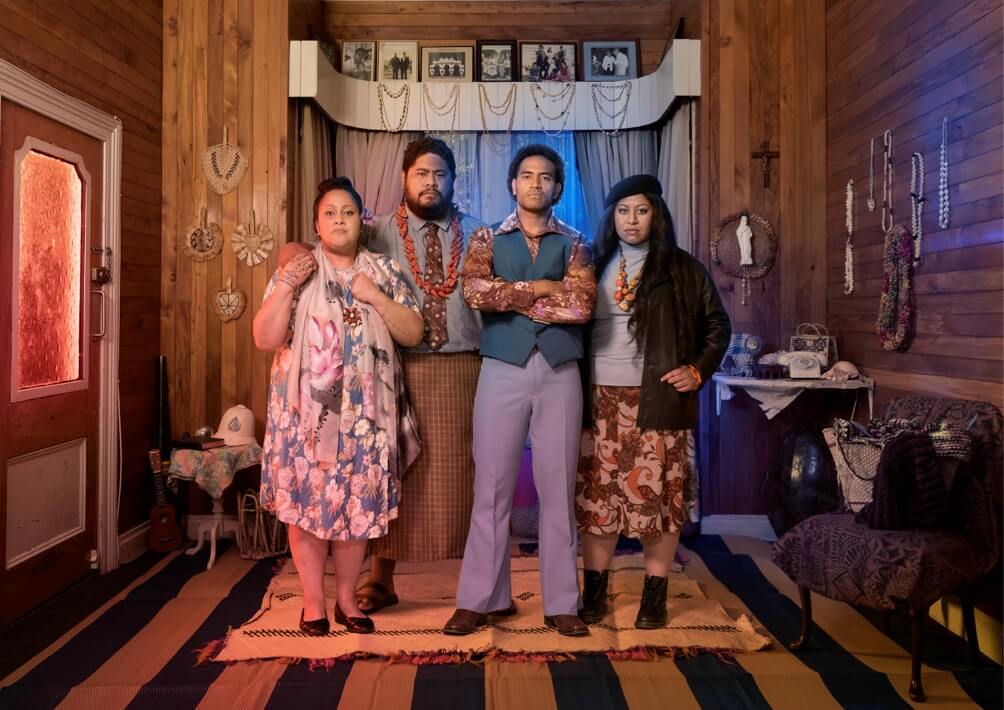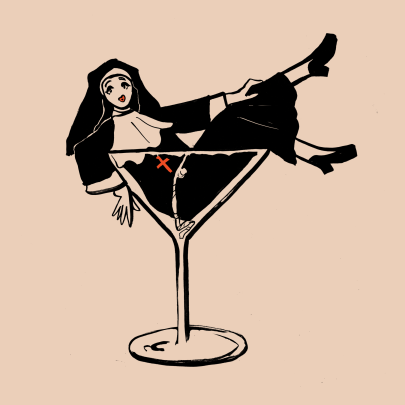Aug 16, 2022 Theatre
Oscar Kightley waited nervously. It was 1990, and the great Michael Jones had returned to rugby after a near-career-destroying knee injury during a test against Argentina in Wellington the year before. For Kightley, a 20-year-old Samoan-born Auckland Star journalist, it was a once-in-a-lifetime chance to meet his hero. Shy and star-struck, young Oscar shook off his nerves and made his way to the field after Michael’s club game for Waitemata, supported by a photographer.
“There were no other journos there,” he says, 30-something years later. “He was covered in mud. He was exhausted. But… he stopped. And he talked to me.” Kightley describes it as one of the best assignments in his fledgling career — and a humbling experience. Michael Jones wasn’t short with him. He wasn’t in a hurry or dis- missive. Instead, he took the youngster seriously, impart- ing a lasting lesson to Oscar about humility — a lesson that Kightley has himself adopted when engaging with young Pasifika. “We don’t all have the same kind of parents and families and upbringings. But there are common denominators in our world. You can rely on certain things being familiar. Not always, you know — I don’t want to homogenise us into one group… But ever since that day, I’ve been like, man, if the great Michael Jones can take time out, treat me with respect and take me seriously — the best rugby player in the world at that time — there’s no excuse for me to be an arsehole.”
Kightley was sure journalism was going to be his job until retirement, but by the end of 1990 he was made redundant from the Star. It wasn’t long before he realised he enjoyed creative writing more. “I discovered that, actually, I love making stuff up. And you can’t really do that when you’re a journo. So it probably wasn’t the best avenue for myself for expression.”
In 1997 he wrote Dawn Raids, a play that kickstarted a conversation about the Dawn Raids in Aotearoa. In August, Dawn Raids is returning: 25 years since Kightley first shared his play with the world and one year since the government’s formal apology for the raids of the mid-1970s. It was first performed by Aotearoa’s “longest running Pasifika performing arts group” Pacific Underground, or PU, a collective he had helped form in Christchurch in 1993. This year it is being restaged at ASB Waterfront Theatre as a co-production between Oscar’s old friends at PU and Auckland Theatre Company (ATC). The collaboration was initiated by artistic director and CEO Jonathan Bielski, who says Dawn Raids remains deeply relevant today. “Dawn Raids has the strengths and weaknesses of a first-time play,” he says. “There is rawness, unburnished edges. But that youthful uninhibitedness also generates intensity and fearlessness. In the hands of these new Pasifika theatre artists, it is going to be dynamite.”
Dawn Raids is a visceral tale, centring on one Pasifika family and bringing their story to life from the inside out. Tanya Muagututi‘a from Pacific Underground says it’s about a family trying to survive during a disruptive time. “They’re already trying to make ends meet and doing everything… Now they’re dealing with the Dawn Raids, and each character has a different reaction.” Muagututi‘a highlights Kightley’s ability to project many points of view from the distressing period, making the show historically precise. At the time of our Zoom chat, he was at South Pacific Pictures filming the first season of teen comedy series Duckrockers, his latest co-writing and directing project. Asked about the genesis of Dawn Raids, he says he spent a year researching the issue, a process aided by his training as a reporter. The raids began in 1974, soon after a young Kightley was sent to Auckland from Samoa to live with an aunt in Te Atatū. He’d always known about them, Kightley says, but they were rarely discussed openly. The story had been left alone both by those who were traumatised from the events and by the organisations that had enabled them. Will ‘Ilolahia, a Polynesian Panther, Agnes TuiSamoa, a community organiser, as well as a PIC church minister, and an ex-cop were some of the key figures Kightley interviewed to try to present an accurate picture of what had happened. “Every character in the play is based on my interviews. The things I learned, the people I met. No one had done anything about it before — I just wanted to tell a story of that time.”
Before the official apology from the New Zealand government in August 2021, before the The Panthers miniseries, before the music label Dawn Raid (and the 2020 film of the same name, directed by Kightley, detailing the entertainment label’s rise to fame), there was Oscar, a young Polynesian man determined to tackle a taboo topic and address an “old newspaper story”. Kightley grew more and more horrified during his research by how the raids were the result of the attitudes of the powerful. “It wasn’t a shadowy group of white supremacists. It was the government, supported by the police.”
The play was popular. Although staged at a time when many Pākehā refused to acknowledge their own racism, let alone the harm the raids had caused, it was loved by Pasifika audiences, who valued seeing their stories being told. For the older watchers, reliving some of the memories hurt, which Oscar acknowledges. “It was like a darkened theatre was almost a safe place to have those thoughts again, to think about it.”
Dawn Raids was a career milestone for Kightley; a landmark between discovering creative writing in Christchurch alongside Samoan musos, actors and dancers, and co-founding the hilarious Naked Samoans crew in 1998. Collaboration is integral to Oscar’s work and it’s not often you’ll see his name alone in the credits. In previous interviews he’s noted that being motivated to do work in collaborative settings or sharing the load has helped him reach the end of a writing project. “I wish I was one of those writers who could wake up and be at the desk at the same time every day. But I’ve never been one of those,” he told Dale Husband in a 2019 interview with E-Tangata. “That’s the discipline — it’s the sitting down. It’s not getting the story ideas. The hard part, for me, is always the sitting still and the starting. Once I’m in there, it’s just magic. I love it.” Dawn Raids, says Kightley, was the first and only play he’s written alone.

Dawn Raids promo shoot by Ross Brown
Pacific Underground, led by Troy Tu‘ua, Tanya Muagututi‘a, and Jake Arona for this Dawn Raids production, are energised and eager for a new stage — but not without reflecting on how far the play has come. In the first Dawn Raids season, Muagututi‘a says her role in the play was memorable — she was the stage manager and in the band. “I wasn’t on stage as much as the other senior members. We were in a different space then. We did it all completely on our own… It was a different time. It was our fifth year of running as a Pacific theatre company and our second production that had everyone involved.”
From the live band to the theatre cast, PU held full creative control — a group of friends creating and putting on shows. For the collective, the aim was to educate audiences on where Pasifika are at in society and share Pasifika stories as an extension of their storytelling culture, an attitude PU continues to cultivate today. For the re-staging in August, Muagututi‘a aims to mirror the Pacific Underground she and Kightley were part of in the early 90s. Working with young people in theatre went hand in hand with educating at the same time. Viewers can expect a couple of PU members’ faces in the play, but the rest of the cast were recruited after lengthy auditions — thanks to the vastly increased numbers of Pacific actors and musicians available. “It shows how we’ve come a really long way with our Pacific performers.”
Both Muagututi’a and Bielski, like Kightley, value the importance of collaboration. “As a largely Pālagi group working mostly in the European idiom of theatre, [ATC] cannot hold a space or a story like Dawn Raids,” says Bielski. “It is for Pacific people to be at the centre of this — and not just the acting or directing, but all the decision-making. That means if we are to be involved at all, then it is through collaboration.”
Towards the end of our conversation, Oscar pauses for a moment when I ask him for his thoughts on the Dawn Raids today. He hasn’t cracked a joke the entire interview. After scouring through videos and articles about his success, it’s at this moment that I finally see him as him — not Oscar the director, or Oscar the celebrity, not even Oscar the writer. I see the same young Polynesian man who wrote Dawn Raids, all those years ago. Just another Pasifika person, angered by the injustice towards his people, excellent with words and equipped with an imaginative mind. I think about the courage it must have taken him to address the Dawn Raids, in his early 20s no less.
Earlier he had shared how a negative review of the play made him feel like giving up. “I didn’t write for a year after that. I didn’t need it to affect me as much as it did — I was too sensitive.” He had put his guts and passion into his first drama, trying to craft a story that hadn’t been told before, only for some reviewer from the Herald to trample on his work in public. At the same time, we can all be grateful that he did take off in another direction, because a year lat- er he formed the Naked Samoans. Without the sensitivity of that young man, we would not be having this conversation today.
I’m pulled back into the present when he responds to my question: how do you see the Dawn Raids conversation from today’s vantage point?
“I was at the apology at the town hall. And it was important that it happened. It’s just like tangata whenua and their painful history that’s still relevant today. Because some things we never corrected or made right. The apology was great, because there was acknowledgement of the pain and the suffering and the horrible thing that happened to our community. The unfortunate thing about it, is that that whole period really embedded attitudes about us among other people. And it really contributed to how others saw Pacific people.”
Some were more affected by the trauma than others. Many people had their life turned upside down. “People still think of us a certain way,” says Kightley, “because of the attitudes that were so prevalent about who we were… You and I know, we’re just normal. We have families, we have dreams, we have hopes, we have aspirations, we have losses, we have failings, we have challenges, just like any other human. But that whole Dawn Raid thing foisted an attitude about us that still exists today. That was generational. And that’s the shame.” Maybe time has to pass for the shame to do the same. Being a year on from the apology might invite a ‘let’s move on’ perspective, but Oscar points out that the raids and apology are not truly events of the past. The reality is that the ripple effects are still pervasive and ongoing.
Kightley’s creative written work, spanning decades, has contributed to the cultural and social fabric of Aotearoa, a form of service that extends to Pasifika communities far beyond his home suburb of Te Atatū. For some, his work has laid the foundation for Pasifika creatives to thrive in theatre, on screen and on television. For others, his approach to comedy and depiction of stereotypical Aotearoa has been — at best — questionable. Oscar and fellow creatives have come under fire in the past for pairing comedy and embedded attitudes in shows like bro’Town, which earned a primetime spot from 2004. Despite those criticisms, screenwriting and writing plays was for Kightley a way of creating that allowed him to say the things that otherwise go unsaid. “Comedy can be a coping mechanism,” he says. “The characters were real people that we knew — those boys were like us when we were little.”
The new staging of Dawn Raids will allow audiences to have their difficult thoughts in a darkened theatre again, sitting shoulder to shoulder with the memories of things that should never have happened. The difference between the original play and the restaging is what audiences will do afterwards. Dawn Raids is arguably one of Kightley’s most important pieces of work. There’s something strategic and necessary about the collaboration between PU and ATC — a restaging of a play from the 90s, written about the 70s, almost exactly a year on from the government’s apology. Jonathan Bielski notes that the injustice may have been acknowledged, but has it been atoned for?
“The production will stand as a question, a provocation — what happens now?”
Dawn Raids is a co-production between Auckland Theatre Company and Pacific Underground by arrangement with Playmarket.
Performances run 16 August — 3 September 2022. For all ticket and show details see www.atc.co.nz
–






